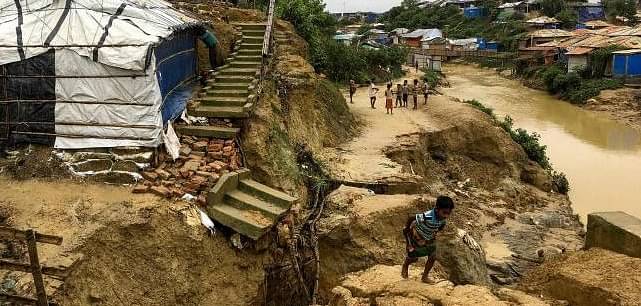7 June 2021
The South Asian monsoon in the time of a pandemic
Posted by Dave Petley
The South Asian monsoon in the time of a pandemic
The start of June marks the onset of the South Asian summer monsoon. As I have noted previously, this is by far the most important annual global process in terms of landslides. The monsoon typically strengthens reasonably quickly through June, peaking in mid-July, and then slowly declining through to the autumn. In landslide terms, the events mostly occur when the monsoon reaches the hills of Sri Lanka, Kerala in W India and the Himalayan Arc across the north of South Asia. The monsoon advances from the southeast, so Bangladesh and Sri Lanka are often affected first.
Over the weekend, heavy rainfall in Bangladesh caused landslides and extensive flooding and landslides killed a number of people in Sri Lanka. Thus, the impacts of the monsoon are starting to be felt.

A 2019 monsoon landslide in a Rohingya refugee camp in Bangladesh. Image from https://en.prothomalo.com/.
.
The monsoon this year is going to be different. There is nothing unusual meteorologically as far as I’m aware, but in South Asia civil society is under severe stress. The two most affected countries in South Asia in terms of landslides are India and Nepal, both of which are being desperately impacted by Covid-19, with hospitals operating beyond capacity. The population will be especially vulnerable this year, and supply chains are very stretched. Thus, it is reasonable to expect that the impacts of the monsoon may be more severe than normal.
In Bangladesh, vulnerability has been increased by the continued presence of the large displaced Rohingya population, living in camps that are affected by landslides. It is salient to note that two people were killed in landslides in these camps over the weekend. And in Myanmar / Burma, the massive civil unrest following the coup earlier this year is also likely to have raised vulnerability. Mining-induced landslides are particular problem there, a result of both poor regulation and scavenging driven by economic disadvantage. The coup is unlikely to have reduced the impact of either of these two issues, but reliable reporting of landslides may have become more difficult.
In summary we are heading into the unknown in terms of South Asian summer monsoon this year, but I fear that it could well be a bad one.


 Dave Petley is the Vice-Chancellor of the University of Hull in the United Kingdom. His blog provides commentary and analysis of landslide events occurring worldwide, including the landslides themselves, latest research, and conferences and meetings.
Dave Petley is the Vice-Chancellor of the University of Hull in the United Kingdom. His blog provides commentary and analysis of landslide events occurring worldwide, including the landslides themselves, latest research, and conferences and meetings.
Interesting and insightful perspective. Would love to see more data & analysis on the relationship between monsoon and landslides.